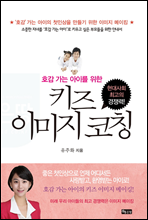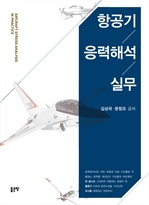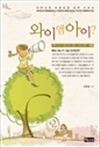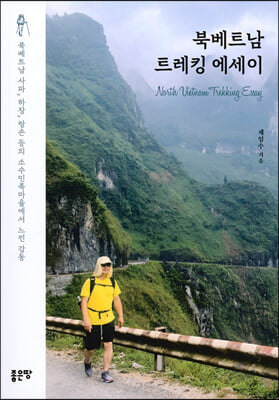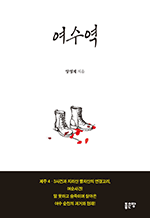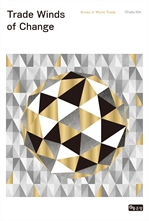
Trade winds of change
- 저자
- Chulsu Kim
- 출판사
- 좋은땅
- 출판일
- 2014-05-10
- 등록일
- 2014-09-01
- 파일포맷
- EPUB
- 파일크기
- 0
- 공급사
- 북큐브
- 지원기기
- PC PHONE TABLET 프로그램 수동설치 뷰어프로그램 설치 안내
책소개
영문으로 출간된 『Trade Winds of Change: Korea in World Trade(변화의 무역풍: 세계 무역 속의 한국)』은 국제적인 청중을 대상으로 한국의 통상정책을 이해시키고 한국이 당면한 세계적인 무역 문제에 대해 어떻게 대응해 왔는지를 그 내용으로 하고 있다. 이 두 권의 책은 서로 다른 내용을 담고 있지만 같은 시대의 유사한 통상문제들을 다루고 있어 같이 보면 한국의 통상정책을 이해하는데 참고가 될 것으로 보인다.
저자소개
Chulsu Kim
Dr. Chulsu Kim has led a long and distinguished career in international
trade. Having started out in the Ministry of Trade, Industry and
Energy in 1973, he rose to become the Minister in 1993. He also
served as the Deputy Minister for Trade and in that capacity, was
Korea’'s chief trade negotiator for bilateral and multilateral issues.
In his personal capacity, he chaired the negotiating group on MTN
Agreements during the Uruguay Round from 1987 to 1990. After that,
he served as the Commissioner of Korea Intellectual Property Office,
President of KOTRA, a trade and investment promotion agency of the
Korean government, and Ambassador for International Trade.
After leaving the Korean government in 1995, he became the Deputy
Director-General of the WTO and served in Geneva for four years. He
returned to Korea in 1999 to teach trade policy at Sejong University
and to serve as the university’s President from 2002 to 2005. After
retiring from the university, he moved to Lee International, a law
firm based in Seoul, to become a senior advisor. He also helped found
the Institute for Trade and Investment, a trade policy research and
651
consulting organization, as an affiliate of the law firm and serves as
its Chairman.
Dr. Kim is a graduate of Tufts University and University of
Massachusetts, where he received his Ph.D. in Political Science in
1973. He also received his honorary doctorate degrees in law from the
University of Massachusetts and Franklin Pierce Law Center in 1997
and 2006, respectively.
Dr. Kim received Order of Service Merit, Red Stripes (1981), Yellow
Stripes (1991) and Order of Diplomatic Service Merit Gwanghwa Medal
(1995) from the Korean Government. He also received the Benjamin
Rush Award for public service from Dickinson College in 1993 and
James Van Fleet Award from Korea Society in 1996 for his contribution
to Korean-American relations. He is also the recipient of the first
Korea Negotiation Award in 1996 and International Trade Person
Award in 2004.
목차
Abbreviations
Chapter 1 Competition, Cooperation and International Trade
1. Competition and Cooperation in the 21st Century ?
2. World Economy: Where’s the Competitive Edge? ?
3. Six Steps to Unthether Trade ?
4. Trade Winds of Change ?
5. International Cooperation for the Semiconductor Industry in the 21st Century
Chapter 2 Trade, Intellectual Property and Development
1. Korean Model of Economic Development ?
2. Energy and Economic Development ?
3. Recent Developments in Korea’s Intellectual Property Rights Protection ?
4. Integrating Intellectual Property into the National Development Policy: the Korean Experience ?
Chapter 3 The Evolution of Korea’s Trade Policies
1. Korea’s Trade and Industrial Policy ?
2. Korea’s Experience in Trade Expansion and Growth ?
3. Korea’s Accession to the GATT ?
4. Korea in the Uruguay Round ?
Chapter 4 Korea’s Trade Relations with the United States
1. Korea’s Trade Policy and the Korea-U.S. Trading Relationship ?
2. Major Issues in U.S.- Korea Trade: A Korean Perspective ?
3. Super 301 and the World Trading System: A Korean View ?
4. The Present and Future of Korea-U.S. Economic Relations ?
5. The Next Step in U.S.-Korean Relations ?
6. Korea-U.S. Industrial Alliance in the Changing Global Economic Order ?
7. U.S.-Korean Future Relations in the Emerging Trade Order ?
8. Acceptance Remarks ?
9. Surmounting South Korea’s Domestic Opposition to the FTA ?
10. Acceptance Speech ?
Chapter 5 Korea’s Trade Relations with China
1. Trade and Investment between Korea and China ?
2. China Vis-a-Vis the World Trading System ?
3. How Asia Feels About China’s Entry into the WTO ?
4. China’s Relation to the Rest of the World and Challenges at Home ?
5. China’s Market-Opening Policies and the World: Perceptions and Expectations 6. China at Ten in the WTO ?
Chapter 6 Korea ’s Relations with Other Major Trading Partners
1. The Future of Korean-Japanese Economic Relations ?
2. EC-Korea Trade Relations: A Growing Partnership ?
3. The Future of Korean-Indian Economic Relations ?
4. Korea’s Expanding Economic Ties with Italy ?
5. Korea’s Economic Outlook and Korea-Finland Economic Relations ?
6. Korea-Australia Economic Cooperation in the Age of East Asia ?
7. The Future of Economic Partnership between Korea and Mexico ?
8. France and Korea: Opportunities for a Prosperous Future ?
Chapter 7 Asia in the World Trading System
1. Northeast Asia and the U.S. Business ?
2. Freer Business Environment for Sustained Regional Dynamism ?
3. East Asia in the Emerging World Trading Order ?
4. Asia-Pacific and the Multilateral Trading System ?
5. East Asia in World Trade ?
6. Outlook for Asian Economices in the Year 2003 ?
7. Northeast Asian Economy in the Globalizing World ?
8. East Asian Regionalism: Present Status and Future Prospects ?
9. East Asia in WTO Dispute Settlement Mechanism ?
10. Finding New Sources of Growth in East Asia
Chapter 8 The Regional Trade Cooperation in East Asia
1. Institutionalizing Asia-Pacific Economic Cooperation: Rationale, Goals and Modalities ?
2. Economic and Political Integration of Asia and the Americas: Goal or Folly? ?
3. The New WTO: Prospects and Challenges in Relation to the Future of APEC and Other Regional Agreements ?
4. The Korea-Japan FTA ?
5. The Korea-Chile Free Trade Agreement and Korea’s FTA Policy ?
6. Korea’s FTA Initiatives ?
7. East Asian Free Trade Area (EAFTA): A View on Membership and Modalities 8. Beyond EAFTA, CEPEA and FTAAP: an ASEM FTA? ?
9. The Next Step in East Asian Economic Integration ?
10. Korea’s FTA Policy ? 462
11. New Opportunities for Advancing Regional Economic Integration in East Asia 12. Future Prospects for FTAs in the Asia-Pacific Region ?
Chapter 9 WTO: Achievements and Challenges
1. The Priorities for the WTO ?
2. New Issues for the Multilateral Trading System : The Current State of Play and Future Prospects ?
3. New Issues for the Multilateral Trading System : Singapore and Beyond
4. The WTO - The Balance Sheet So Far
5. A WTO Perspective:Where Now? Expanding the Boundaries of the WTO:The Millennium Round ?
6. Restoring Momentum to the Multilateral System ?
7. Is the Doha Still Doable? ?
8. Financial Crisis, Doha Round and the Multilateral Trading System ?
Chapter 10 WTO Rules and the Multilateral Trading System
1. Integrating Russia into the Global Trading Community ?
2. In Search of an Economic Identity: The Region’s Role in the Global Economy ?
3. Indian Economic Reforms and the WTO ?
4. Issues in the Negotiations on China’s Accession to the WTO System ?
5. Textiles and Clothing in the WTO ?
6. Regionalism: Agenda for the WTO ?
7. International Standardization and International Trade ?
8. Multilateral Trading System and Developing Economies ?
9. The Multilateral Trading System and Sustainable Development ?
10. Dismantling Discrimination against Labor-intensive Manufactures and the Reform of the WTO Escape Clauses ?
Index ?
About the Author

